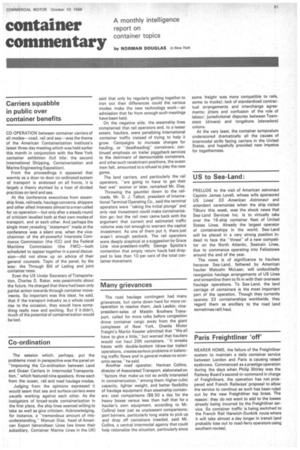Many grievances
Page 53

If you've noticed an error in this article please click here to report it so we can fix it.
The road haulage contingent had many grievances, but came down hard for more cooperation to resolve them. Jack Lesikin, vicepresident-sales of Maislin Brothers Transport, called for more talks before congestion drove container cargo away from the giant complexes of New York. Oneida Motor Freight's Martin Kessler admitted that "We all have to give a little," but warned that hauliers would not haul 20ft containers. "It wreaks havoc with double-bottom (draw-bar trailer) operations, creates serious problems in balancing traffic flows and in general makes no economic sense," he said.
Another road operator, Herman Collins, director of Associated Transport, elaborated on "factors that make us not so avidly interested in containerization," among them: higher cubic capacity, lighter weight, and better flexibility of haulage equipment than steamship containers; cost comparisons ($8.50 a day for the heavy boxes versus less than half that for a haulier's own equipment, according to Mr. Collins) bear just as unpleasant comparisons; port barriers, particularly long waits to pick up and drop off containers (needed, said Mr. Collins. a central intermodal agency that could help rationalize the situation, particularly since some freight was more compatible to rails, some to trucks): lack of standardized contractual arrangements and interchange agreements; jitters and confusion of the role of labour; jurisdictional disputes between Teamsters (drivers) and longshore (stevedore) unions.
At the very least, the container symposium underscored dramatically all the causes of intermodal strife facing carriers in the United States, and hopefully provided new impetus for togetherness.
























































































































